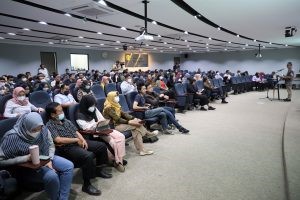
Financial system is a unit consisting of financial service institutions, financial markets, and financial infrastructure, including payment systems that interact in facilitating the collection of public funds. Then the allocation of financial system is to support national economic activities as well as corporations and households connected to financial service institutions.
This was conveyed by Chairman of the Board of Commissioners of the Financial Services Authority (OJK) Mahendra Siregar in a Public Lecture for the Master’s Program in Management, Faculty of Economics and Business, Universitas Indonesia (MM FEB UI) on Friday (3/3). This activity carried the theme “Supervision and Resilience of the Indonesian Financial Industry” moderated by Head of MM FEB UI Study Program Prof. Rofikoh Rokhim, Ph.D., and was opened directly by Dean of FEB UI Teguh Dartanto, Ph.D.

In his presentation, Mahendra said that if the financial system is unstable, it will result in abnormal monetary policy transmission. The intermediary function cannot work as it should. Improper allocation of funds can hinder economic growth and public distrust. This was followed by investors’ panicked behavior to withdraw their funds which eventually lead to liquidity problems.
Banking loans and outstanding principal at the beginning of 2023 grew by double digits, continuing the strong growth momentum throughout 2022. This growth was higher than the average growth before the pandemic. The risk profile of the financial services industry has also continued to improve as shown by a reduction in the NPL/NPF ratio, a reduction in Covid-19 credit, and maintained profitability and capital. This is due to the result of a very strong synergy between the Ministry of Finance, Bank Indonesia (BI), OJK, and the Deposit Insurance Corporation (LPS) in the Secretariat of the Financial System Stability Committee (KSSK) and independently.
“For 2023, OJK sees that economic growth can still be maintained at a level of around 5%, supported by well-maintained political conditions and a strong financial sector. In the financial sector, OJK is also optimistic that the positive trend will continue. Bank credit is projected to grow by 10%-12%, supported by growth in third-party funds of 7%-9%,” said Mahendra.
In the capital market, the emission value is targeted at IDR 200 trillion. Meanwhile, the outstanding principal of the Non-Bank Financial Industry (IKNB) is projected to grow 13%-15% in line with increasing public mobility. Meanwhile, life insurance and general insurance assets are expected to grow by 5%-7% amid the reform program carried out by OJK. Pension fund assets are also expected to grow at the same rate.
Mahendra further said that OJK’s role in maintaining financial system stability is based on the implementation of the P2SK Law of 2023, namely affirming OJK’s institutional status as an independent state institution, increasing the scope of OJK supervision (such as derivative financial service activities and carbon exchanges as well as bullion businesses, cooperatives in the financial services sector, affirming supervision of market behavior, technological innovation in the financial sector), and affirming and increasing the authority of the OJK (consisting of investigations of criminal acts in the financial services sector, authority to take legal action against illegal financial entities, settlement of financial crimes through restorative implementation justice by prioritizing the return of consumer losses so that a deterrent effect can be realized for violators.

This public lecture was also attended by participants via zoom (online) who came from Universitas Sebelas Maret Surakarta; Universitas Lampung; Universitas Katolik Parahyangan; Universitas Udayana; Universitas Mataram; Universitas Tarumanagara; Universitas Andalas;l Universitas Bengkulu; Universitas Bhayangkara Jakarta Raya; Universitas Bina Nusantara; Universitas Jambi; Universitas Kristen Satya Wacana; Universitas Muhammadiyah Tangerang; Universitas Padjajaranp; Universitas Syah Kuala; Universitas Sriwijaya Palembang; dan Universitas Lambung Mangkurat.
Author: Public Relations of FEB UI | Editor: Maudisha



